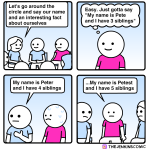AllenWoody
Really Really Experienced
- Joined
- Mar 6, 2018
- Posts
- 365
I'm sure this is a common problem, or at least a familiar challenge. I'm starting a new fantasy series and will need names for people, creatures, and divine beings in this world. I can come up with good names -or so I tell myself- but they're inevitably in use somewhere, usually Warhammer or some such. A couple have turned out to be the names of bands or someone's Instagram artist account.
What do y'all do in this situation? Keep inventing ever weirder names until they pass the Google test? Find names that, while in use somewhere, at least aren't major characters? Say the eff with it and name them however you wish?
AW
What do y'all do in this situation? Keep inventing ever weirder names until they pass the Google test? Find names that, while in use somewhere, at least aren't major characters? Say the eff with it and name them however you wish?
AW
